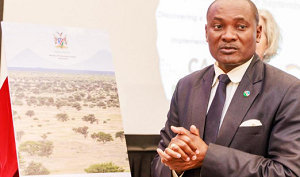
Namibia can generate N$76 billion from bush encroachment says official

Namibia could generate up to N$76 billion over the next 25 years if the 15.8 million hectares of bush encroached land is thinned sustainably, Environment, Forestry and Tourism Minister Pohamba Shifeta said.
Shifeta said this overall target of the recently launched National Strategy on the Sustainable Management of Bush Resources 2022-2027. The strategy was launched on 08 September at the Standard Bank Biomass Fair in Windhoek.
It is the result of eight years of cooperation between the Ministry of Environment, Forestry, and Tourism’s Directorate of Forestry and its bilateral project, the Bush Control and Biomass Utilisation Project implemented by GIZ.
It provides a framework for ensuring that bush resources are utilised in a sustainable and value-added manner, and that the development of the bush biomass sector benefits all Namibians and the environment.
“It is critical that our bush control efforts contribute to the achievement of important international commitments on deforestation and afforestation, land degradation and desertification, climate change mitigation and adaptation, as well as biological diversity conservation, as outlined in the Rio Conventions. Adaptation to climate change is a top priority for Namibia, and restoration of our Savannah, bush biomass utilisation, and value addition are identified as key 7 adaptation,” the Minister said.
Ulrike Metzger, Head of Cooperation at the Namibian German Embassy who was speaking at the fair said the charcoal value chain contributes significantly to Namibia’s trade balance as one of the largest agricultural exports, besides meat and grapes.
“Our renewed commitment to the Bush Control and Biomass Utilisation Project has a strong focus on the implementation of the National Strategy, with three key outputs: providing support to MEFT with the implementation of the National Strategy and mainstreaming within the broader context of the Rio Conventions (biodiversity, climate change, and desertification); establishing a National Dialogue Platform to address bottlenecks in the biomass sector; and developing inclusive and innovative business models around carbon credits, linking bush utilisation to climate change mitigation,” Metzger said.








































